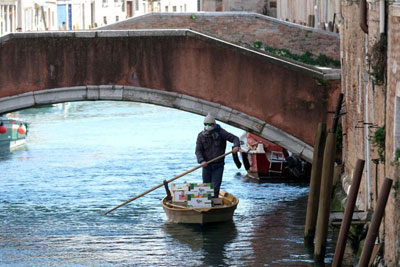What the coronavirus pandemic tells us about our relationship with the natural world
View(s):COVID-19 is fundamentally a story of humanity’s ever-encroaching relationship with all other living things on this planet writes Emma Gilchrist
There are moments in life that are etched into our collective consciousness forever. When the planes struck the World Trade Center. When Princess Diana was killed in a car crash. When the world ground to a halt to help slow the spread of COVID-19.

Clear waters in Venice’s famous canals as a boatman makes deliveries of fruit and vegetables on March 25. REUTERS/Manuel Silvestri
It’s during moments like these that we often shift how we think about the world — and about our place in it.
It’s easy to feel invincible in a modern society in which we live longer than ever before, never have to see where our food comes from and can point a phone at the sky and have it tell us what constellation we’re looking at.
And yet, despite all of the technological advancements of the last century, we are still rendered powerless to nature — to hurricanes, floods, fires, earthquakes and, yes, viruses.
The story of COVID-19 is, at its core, a story of humanity’s ever-encroaching relationship with all other living things on this planet.
In a prescient piece in The New York Timesin 2012, environmental journalist Jim Robbins wrote about a developing model of infectious disease that shows most epidemics are a result of things people do to nature.
“If we fail to understand and take care of the natural world, it can cause a breakdown of these systems and come back to haunt us in ways we know little about,” Robbins wrote.
“Disease, it turns out, is largely an environmental issue. Sixty per cent of emerging infectious diseases that affect humans are zoonotic — they originate in animals. And more than two-thirds of those originate in wildlife.”
Many ubiquitous modern diseases originated in animals. AIDS, for example, came about after hunters in Africa killed and butchered chimpanzees and the virus crossed into humans.
In the case of COVID-19, the virus is thought to have originated at a wild animal market in Wuhan, China, where it may have made the leap from bats to pangolins to humans.
As we push into increasingly remote places to extract oil, gas, minerals and trees, we come into contact with new species and drastically increase the likelihood of the emergence of new diseases. A warming world is also linked to an increase in the spread of disease(one need look no further than the spread of Lyme disease in Canada for an example).
In a recent opinion piece in The New York Times,Peter Daszak, a disease ecologist and the president of EcoHealth Alliance, argues that as the world struggles to respond to COVID-19, we risk missing the big picture.
“Pandemics are on the rise, and we need to contain the process that drives them, not just the individual diseases,” Daszak wrote. “Plagues are not only part of our culture; they are caused by it.”
He added that spillovers of diseases from animals to humans are “increasing exponentially as our ecological footprint brings us closer to wildlife in remote areas and the wildlife trade brings these animals into urban centers. Unprecedented road-building, deforestation, land clearing and agricultural development, as well as globalized travel and trade, make us supremely susceptible to pathogens like corona viruses.”
It’s easy right now to get caught up in the constant news updates of cancelled flights, closed borders and death tolls — and all of those things are surely important — but there is a much grander opportunity here to transform the way we think about our place in the world as one of the many living creatures that inhabit this planet.
As human activity wanes, we are now witnessing the natural world react to the slow-down in all sorts of ways: deer wandering the streets of Japan, Venice canals so clear you can see fish, improved air qualityworldwide.
It’s a reminder of the tremendous impact humans have on the world around them, often without fully realizing it. It’s also a reminder of the natural world’s ability to rebound and our ability to shift our behaviour when we absolutely must.
Much ink has been spilled about what this all says about our ability to fight climate change, but a temporary decline in greenhouse gas emissions because of a deadly plague and a flailing economy doesn’t tell us much about whether this pandemic will bring lasting behavioural changes.
Will more people work remotely when this is all over? Will we ease up on massive business conferences? Will we all realize that making puzzles with our loved ones is more fulfilling than running around buying things? Will we value our concerts and classes and sports games on a new level? Maybe. But it’s too soon to say.
A few things do seem clear though.
First of all, trustworthy news and reliable facts are critically important during times of crisis. The Seattle Times, reporting at the epicentre of the biggest outbreak in the U.S., has seen a surge in readership and subscriptions.
Secondly, communities are coming together in ways we haven’t seen in many decades. Community-scale solutions are going to become ever more necessary as the pandemic spreads. Gardens. Friends. Family. Neighbours. This is a moment to take stock of the simple things and, perhaps, re-adjust our priorities moving forward.
Thirdly, change is possible. Politicians are now taking bold measures unimaginable even days ago. This pandemic will leave an enduring mark on all of us as we contemplate the fragility of life, the cracks in our globalized economy, our interconnectedness with all living things and, ultimately, our ability to envision a future different from the status quo.
- (Reprinted with permission
from The Narwhal)



